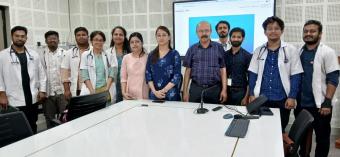One of the benefits provided by the Angels initiative is the constant improvement in stroke care by optimizing hospital procedures; achieved through specific training and education based on ESO guidelines of best clinical practice.

In November 2016, we were visited by the Angels Consultant responsible for Portugal, Prof. Cláudia Queiroga, in order to present the project and to learn about the reality of Centro Hospitalar Universitário do Algarve (CHUA) so that we could find points of convergence that would best serve the patients and professionals of this institution.
The premise of the Angels project is based on the European Stroke Organization's (ESO) view that all stroke patients should receive the same level of treatment regardless of where they live in Europe.
Adhering to this European vision, the CHUA stroke team agreed with the Angels Consultant to establish goals, to evaluate continuously and to conduct several Code Stroke simulations, assessing all procedures and their duration followed by multidisciplinary team discussion involving medical staff, nurses and technicians.
This has consequently led to several unique training activities, the first one being a collaboration with Dr. Jaime Pamplona from Centro Hospitalar Lisboa Central - São José Hospital on the topic of “Imaging in Stroke Care”, which brought together Stroke Unit and Radiology collaborators to further clarify the crucial role of imaging in making therapeutic decision and ways of proceeding. We were also involved in a pre-hospital training for the District Fire Departments to review concepts and approaches, and a Code Stroke training for the National EMS teams in order to optimize the quick and correct referral of a stroke patient.
In another training, we used tools made available by Angels such as the Body Interact software to see the approach of different teams from various hospitals, with emphasis on interaction and discussion of the cases.

With support from the Angels initiative, continuous monitoring, multidisciplinary and transversal training activities have been developed, involving the reality of CHUA in concrete and staying up to date with the best international clinical practices. Now our medical and nursing teams are more alert regarding the times and the need for records. We began organizing data by collecting door-to-needle and decision-making times in a table accessible to all Code Stroke doctors and, more recently, we started recording our data in the RES-Q registry.
The biggest change we’ve applied since working with Angels is to treat patients in the CT room, where everything needed to handle a Code Stroke would be delivered in a stroke bag, considerably shortening our door-to-needle time by about 30 minutes.
The contribution of the Angels initiative was instrumental in the training of professionals, improving the quality of records and adopting new attitudes that translate into greater organization, quality of care and motivation of the team. CONGRATULATIONS ANGELS PROJECT.



